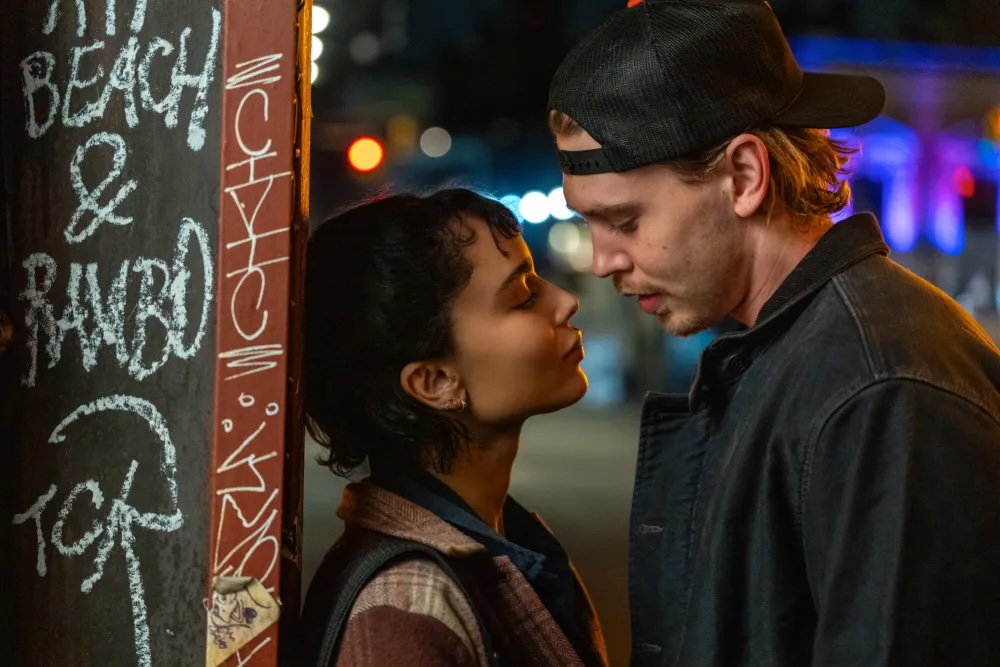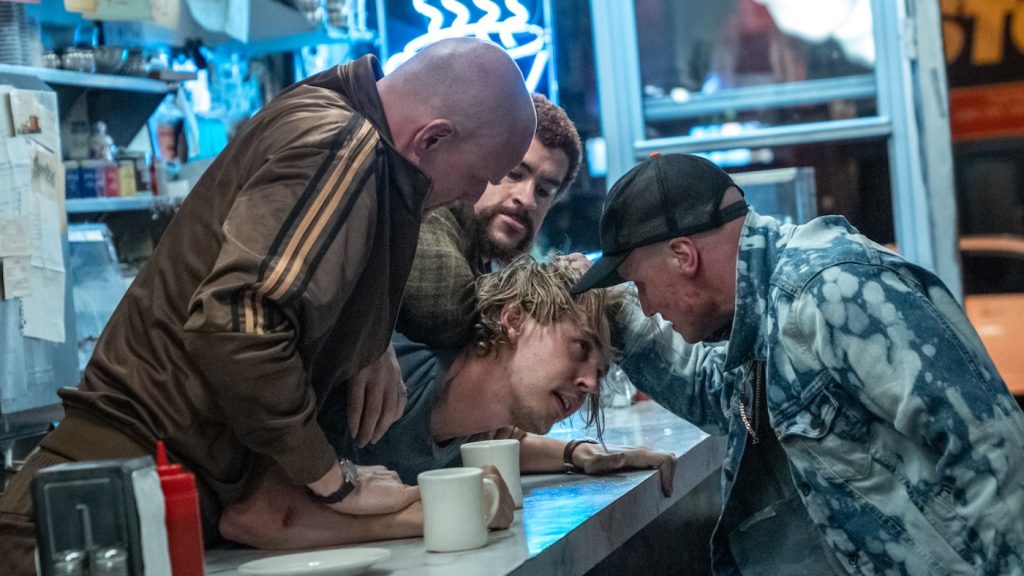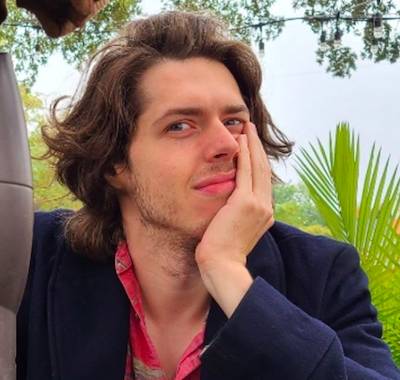Novelist & Screenwriter Charlie Huston on Preserving the Raw Truth of “Caught Stealing” With Darren Aronofsky
In 2008, author Charlie Huston and filmmaker Darren Aronofsky had breakfast. The filmmaker was interested in adapting the author’s debut novel, “Caught Stealing,” the first entry in the Hank Thompson trilogy. The collaboration didn’t come to pass.
In 2022, Huston revisited the script they wrote for Caught Stealing, which tells the story of Hank (Austin Butler), a former baseball star and now an alcoholic bartender, caught in the crossfire of criminals chasing a bag of dirty money.
The script is a lean, mean crime adventure set in ’90s New York City. Hank’s punk neighbor, Russ (Matt Smith), asks the bartender to watch his cat while he leaves the country. The cat holds the key to a considerable fortune, which has caught the attention of various gangsters and the NYPD. After a series of mistakes, mishaps, bruising beatdowns, and chases, all exacerbating years’ worth of bad life choices, Hank places himself and those closest to him, including Yvonne (Zoë Kravitz), in danger.
The crime project came back around 2022, after Huston sent a polished script to Aronofsky. Three years later, Caught Stealing is an acclaimed crime caper, a mad dash through a not-so-distant New York City of the past buoyed by crackerjack performances and Aronofsky’s always able directorial command. Recently, Huston spoke with The Credits about adapting their debut novel, polishing the script until it was ready for prime time, and more.
How’d you approach your first crack at the script?
I was very schematic about it because I had a super cynical motivation, which was that if you option my book, you’ve got to option my script. I didn’t try to reinvent it. I just wrote the story as it was on the page. There were things that I made more cinematic. There were characters I eliminated. There was storytelling that I simplified. I collapsed the moment when he broke his leg in the baseball game, and then had the car crash where his friend died. I turned those into a single event: just the car crash.
How faithful did you want to be to your own story?
It’s irrelevant. The book is the book, and it’s there. As long as we’re not turning Hank into a neo-Nazi, you know what I’m saying? I’m saying this in the context of Darren liking the book, and he wanted to tell the story of the book. He didn’t want to reinvent it either. Things that I thought might get jettisoned – nobody’s going to want to have to deal with all the baseball stuff. They’re going to try to minimize the cat as much as possible. People are going to have a problem with Hank throwing up on himself. All these things that I thought might get eliminated in the process, but not Darren, he wanted all of it.
You two didn’t soften Hank’s edges too much. He’s still an alcoholic and an aimless mess. How crucial was preserving his flaws?
I thought that once we were with the studio and talking to any movie star, I really thought there’d be a push to make Hank more active, because that’s a note you were always getting: “Can they be more active?’ Can they do more? Can they drive the story?” Which, to me, is completely contrary to the point. I’m going to talk about Hitchcock without meaning to make a Hitchcock comparison with myself.
Please, go on.
Nobody’s looking at 80% of Hitchcock’s heroes and saying, “They should be driving the story.” The whole point is that they’re caught in circumstances that are out of their control, which they don’t understand until very late in the story. That’s the satisfaction. Those circumstances come with the suspense of being in their shoes and going on that ride with them. These days, there’s not a lot of appetite for that. But that was not the case here. Part of that is because Darren was telling the story that he wanted to tell. Everybody trusts him for good reason.
[Spoilers Ahead]
When Yvonne dies in the book, Hank acknowledges how an action star would react to her death. Instead of fighting, he wants to sleep. How’d you want to stay true to Hank’s reaction to that death?
I can remember being in Video Village the day that we shot Yvonne’s death. Somebody hanging out, was like, “Shouldn’t he go and check on her?” I said, “I think this is authentic. I don’t think there’s any mystery about whether she’s dead or not. Checking on her is just something that we’re throwing at the audience, like we want them to feel better about Hank.” The reaction of horror and going straight to the phone to see if he can get help is an authentic reaction. And then the other thing that I said was, “If this character were female, I don’t think you’d be asking that question. Because it’s a guy, you expect him to take action in a different way. But I think if a female character walked into a room where the dude was dead and went for the phone to call for help, nobody would be saying, ‘Shouldn’t she blah, blah, blah?’”

“Caught Stealing” was your debut novel. How do you look back at the writer you were when you wrote it?
I didn’t know I had the self-discipline to write every day, and that was really what I was chasing as I was in a raw place. I didn’t know what I was doing. I didn’t have a creative outlet. I needed one. I needed structure because I was off my drinking, which I didn’t solve, because I kept drinking for 25 more years. But, I needed something that I was doing that was feeding me creatively. I’d been reading a lot of noir and crime, and I’d never written a noir crime story. I’d written a bunch of short stories, but not like, “I’m going to try and write some kind of noirish short story.”

What was it that made you tell Hank Thompson’s story at that time in your life?
I had a starting place for it, using my day-to-day life at that time as the framework to hang everything on. It was exciting to feel the story grow, to have things click into place. I was engaged with it when I was away from it, thinking about it, and scribbling things down. The night that I finished it — and of course, this is a long time ago, so I’ve got my mini disc with my book on it — I went down to the bar. That’s where I worked with the brothers, the real Ed and Paris, who are [criminals] in the book but got written out of the movie, unfortunately. I went down to see those guys and told them that I’d finished my book. When you do something that you’ve always admired in others, always thinking to yourself, “Oh boy, I wish I could do that, but I’ll never do that,” and you do it, at that point, anything else would’ve been icing on the cake for me.
I’ve heard from writers that they learned a lot about storytelling from working at bars. Was that your experience?
Specifically for Caught Stealing, obviously, it’s intrinsic to the story. It’s a classic first novel where I used so much of my personal experience — everything up to when the guns came out. Basically, I’m just drawing from all my day-to-day life, the geography of the neighborhood, and how I knew New York at that time, what was going on in baseball. I mean, probably the thing that came out of it that fed a part of me that was already there is just a fondness for human weakness and people who don’t have their shit together.
Usually, the best stories to tell.
You pick up a lot about human nature at a bar. You pick up a lot about vulnerability and how people undermine themselves. You see a little bit of people at their best, a little bit of people at their worst. For someone in their early thirties, it’s probably a bit of a graduate course in that. You can get those kinds of lessons working in an office building or being in some hierarchy. You’ll see a lot about human nature that way, too, but maybe it’s not as raw, perhaps. I mean, being amongst those folks and being one of them is a huge part of my life’s journey.
As someone who’s now sober, how do you reflect on the work you produced during that period in your life?
Since I’ve been sober, it’s one of the things I reflect on — this irony that if I had not been an active alcoholic for so long… I mean, Caught Stealing is a novel about an alcoholic, how it’s destroying Hank, and how he’s destroying other people’s lives through his alcoholism. If you look at it hard, that’s what’s going on. Flat out, if I weren’t an active alcoholic, I couldn’t have written that story. And there’s plenty of other stuff that I’ve written. I wrote a five-book vampire series effectively about addiction. I look at my life experience. I look at how I’ve lived, the choices that I’ve made, and I have to recognize that there’s a great deal that I have been able to draw from those experiences to create opportunities that I wouldn’t have otherwise had. Although I was never a drinking writer. I drank every single day, seven days a week, 365 days a year, but it was always after the work was done. It was always about getting the work done. Now, I can have my drinks. Now, I can maintain it. But it was present in terms of the addiction itself, in terms of the disease itself; it was always present in what I was writing. I just wasn’t aware of it.
Featured image: Russ (Matt Smith) and Hank (Austin Butler) on the move in Columbia Pictures CAUGHT STEALING. photo by: Niko Tavernise



